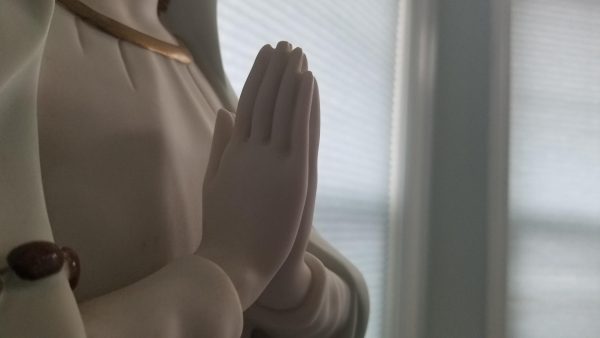No more turns
January 17, 2008
It was just a song we sang.
Less than a mile from my great-grandparents’ home in Maryland, the car always filled with warbling, counting down the turns until yet another arrival.
“Four more turns, and we’ll be there, honey, honey. / Four more turns, and we’ll be there, babe, babe. / Four more turns, and we’ll be there, sittin’ on Gram’s kitchen chair. . .”
And last week as I carried my great-grandmother’s casket from the hearse to her final resting place next to my great-grandfather who passed in 2006, I couldn’t help but hum the melody of a jingle I’ve known all my life to myself. Even though she hasn’t lived in that house for a few years now, the melody is something I’ll always associate with the place and the woman.
“Three more turns, and we’ll be there, honey, honey. . .”
If her suburban Maryland home was a wireless-less zone that I came to begrudge whenever we took a few days out of our lives and an anywhere from six- to nine- hour drive to Westminster, I similarly don’t know or understand much about her life.
She was born in 1915 near the beginning of World War I. She had been a plain-clothes policewoman in an era that still found it appropriate to call her so, therefore rendering an even more courageous role. She was the mother of one, grandmother to three and great-grandmother to four.
But the thing that bothered me the most during the brief ceremony was that I hadn’t taken the time or initiative to find out more.
“. . . two more turns, and we’ll be there, babe, babe. . .”
As the minister told her own observations the evening before at calling hours, I realized it wasn’t so much regretting not knowing Gay-Gay better in life, but rather, the impact of her death caused me to see the influence of a matriarch in an often distant family, by both land and sometime choice. (Gay-Gay is derived from her name, Frances Gaynelle, joining Ho-Ho, my grandmother, and Pop-Pop, ditto grandfather, since my toddling years.)
Gay-Gay taught us all to laugh. My aunt wrote a small eulogy in which she remarked that in her 40 years with her grandmother, the funeral was the first time we’d been with Gay-Gay, and she wasn’t roaring.
She taught the women in her family how to survive in the world, and in each their own way, her life and lessons are truly evident in my grandmother, mother, aunts and sister. She was a proud wife, proper hostess and poignant friend, making you feel like you were all she had to care about but never mincing words when you needed told the truth.
After the calling hours, we sat at one of her favorite local restaurants and shared a memory of Gram.
“She always had a kitchen chair,” was the best I could do then.
But she did. Or a lap. Or a shoulder. Or a hand. Whatever you needed, Gay-Gay never fell through.
“. . .one more turn, and we’ll be there, sittin’ on Gram’s kitchen chair. . .”
So as tears were shed, I couldn’t help but stare at my Gay-Gay, who, even in death, looked spry and ready as ever to tackle the world. When I got word almost two weeks ago that she had passed, I checked the clock. It was about six. Gay was just getting done with evening cocktails. A nightly Manhattan. Somehow I knew heaven was a little louder with her laughter and a little better with her life.
“. . . honey, ol’ baby, mine.”
Adam Griffiths is a sophomore information design major and a columnist for the Daily Kent Stater. Contact him at [email protected].
























